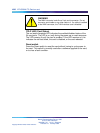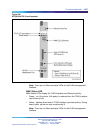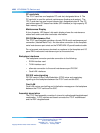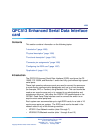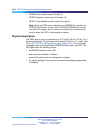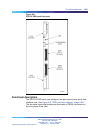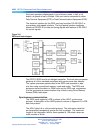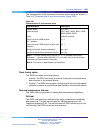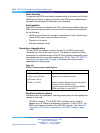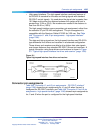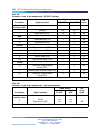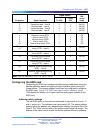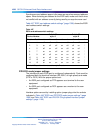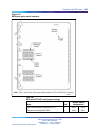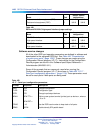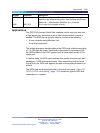
1094 QPC513 Enhanced Ser ial Data Interface card
Fault detection
Firmware on the ESDI card detects hardware faults on the card and link level
LAPB protocol faults. It reports the faults to the CPU when predetermined
thresholds (downloaded at initialization) are exceeded.
Fault isolation
The ESDI/Command and Status Link (CSL) maintenance software takes the
ESDI card out of service when the out-of-service thresholds are exceeded
for the following:
• LAPB error conditions (for example, retransmission, Cyclic Redundancy
Check (CRC) errors, overrun/underrun errors)
•
Physical or link errors
•
Detected hardware errors
Connection characteristics
The two DB-25 connectors on the front panel of the ESDI card provide
connections to each of the two I/O ports. The electrical interface of these
connectors is a modified version of the RS-422-A standard designed to drive
high-speed data over long cable lengths (up to 100 ft). Table 444 "QPC513
interconnection specifications" (page 1094) shows the interconnection
specifications for these ports.
Table 444
QPC513 interconnection specifications
Distance Interconnection
<15.24 m (<50 ft) Regular 25-conductor cable
>15.24 m and <30.48 m Twisted pair for balanced circuits
(>50 ft and <100 ft)
>30.48 m (>100 ft) Network interface devices such as stand-alone
modems or DS-1 facilities using
Asynchronous/Synchronous Interface Module
(ASIM) and Data Line card (DLC)
Electrical interface options
Interface options are selected by inserting jumper plugs into the appropriate
sockets on the card:
•
RS-232-C interface: The EIA RS-232-C interface can be used for
speeds up to 19.2 kbps and distances of less than 15.24 m (50 ft). The
ESDI card supports a subset of the RS-232-C signals. See Table 445
"Connector J1 and J2 pin assignments - RS-232-C interface" (page
1096).
Nortel Communication Server 1000
Circuit Card Reference
NN43001-311 01.04 Standard
Release 5.0 23 May 2008
Copyright © 2003-2008, Nortel Networks
.



